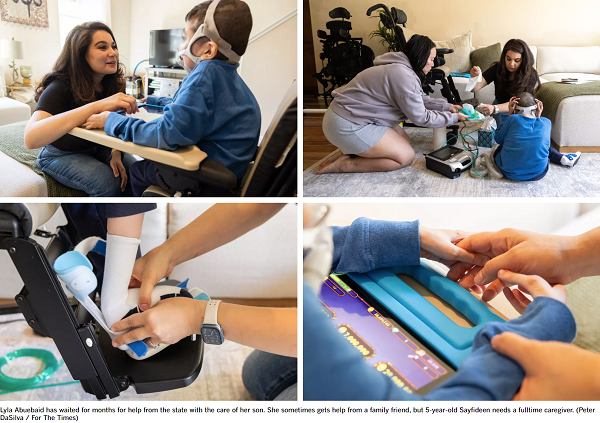Long, frustrating waits for home care persist despite California expanding program
By Emily Alpert Reyes
Staff Writer
July 30, 2024
 Lyla Abuebaid needs to check on her 5-year-old son through the night to make sure he keeps breathing.
Lyla Abuebaid needs to check on her 5-year-old son through the night to make sure he keeps breathing.
Sayfideen has a rare and serious syndrome that leaves him unable to walk. He relies on a ventilator and has to be monitored 24 hours a day, his mother said. Nurses once helped handle his care at home.
But for months now, that work has instead fallen to his mother, who is also juggling her job as a project manager.
“I’m not functioning,” the San Jose resident said. “I’m not doing well at work. I’m not doing well at home.”
Abuebaid said it feels as though she has to “beg the state for services which he absolutely deserves.”
She is among thousands of Californians who have been trying to get Medicaid benefits for services to help medically vulnerable people remain at home through the Home and Community-Based Alternatives waiver.
Demand for the HCBA waiver, which helps people who might otherwise have to live in nursing facilities, has far outstripped the available spots. Last summer, California stopped accepting applications for the program as it hit an enrollment cap. Amid an outcry from disability rights advocates and families, California got federal approval to gradually add 7,200 slots over four years to eventually serve more than 16,000 people at a time.
Yet thousands of Californians remain on the wait list. As of June, more than 4,900 people were waiting, according to the Department of Health Care Services — more than twice as many as last summer.
When people have to wait, either “aging adults or disabled people who need services are going without them, or family caregivers are left to fill in the gaps,” said Nicole Jorwic, chief of advocacy and campaigns for Caring Across Generations. Some could end up in nursing facilities “because there just aren’t alternatives.”
Disability rights advocates had warned the state last year that the planned increase in slots would not clear the existing wait list for years, let alone reach more Californians who might find themselves in need of care as they face unexpected illness or injury.
“I don’t know that they’ve done anything to solve the problem,” said Clovis resident Sarah Scharnick, who first spoke with The Times about the wait list last fall and is still on it. Her husband requires round-the-clock care, including being turned at night to prevent bedsores, after a bicycle crash.
Long hours of nursing care at home are not typically covered by private insurers, forcing many families to resort to placing their loved ones in nursing facilities or to shoulder their care themselves, advocates say. Abuebaid said her private insurance would not cover her son’s nursing care. He had previously gotten assistance through Medi-Cal, the California Medicaid program, then lost his coverage.
Paying for such care out of pocket “would bankrupt a millionaire,” said Katelyn Ashton, executive director of Loretta’s Little Miracles, which cares for medically fragile children. For many families unable to access the waiver, “their only option is to quit their job and provide that care themselves at home.”
State officials said that with the added slots, nearly 10,800 people could be in the program at a time this year. Despite the demand for the program, however, more than 1,500 HCBA slots remained unfilled as of June, according to the healthcare services department.
The reason: The department said it is currently releasing only…
[READ THE COMPLETE ARTICLE HERE]
